|
|
|
Sort Order |
|
|
|
Items / Page
|
|
|
|
|
|
|
| Srl | Item |
| 1 |
ID:
104790
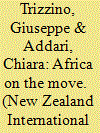

|
|
|
| 2 |
ID:
111732
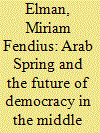

|
|
|
|
|
| Publication |
2012.
|
| Summary/Abstract |
The success of the Arab Spring depends on new governments being able to meet youth's economic expectations, and Israel could still contribute to a new regional conversation on economic and social reform.
|
|
|
|
|
|
|
|
|
|
|
|
|
|
|
|
| 3 |
ID:
110324
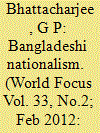

|
|
|
| 4 |
ID:
130027
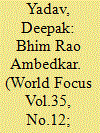

|
|
|
|
|
| Publication |
2014.
|
| Summary/Abstract |
Dr Ambedkar's legacy as a socio-political reformer had a deep effect on modern India. He believed that "political democracy without social democracy and economic justice is meaningless." In post-Independence India his socio-political thought has acquired respect across the political spectrum. His initiatives have influenced various spheres of life and transformed the way India today looks at socio-economic policies, education and affirmative action through socio-economic and legal incentives. His reputation as a scholar led to his appointment as free India's first law minister, and chairman of the committee responsible to draft a constitution. He passionately believed in the freedom of the individual and criticized equally both orthodox casteist Hindu society.
|
|
|
|
|
|
|
|
|
|
|
|
|
|
|
|
| 5 |
ID:
108697
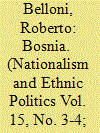

|
|
|
|
|
| Publication |
2009.
|
| Summary/Abstract |
The process of implementation of the Dayton Peace Agreement in Bosnia has come to a halt. Particularly since 2006, nationalist rhetoric has increased, political, economic, and social reforms have stalled, and some analysts warn that the country might be sliding towards collapse. This article traces the roots of the current crisis in the 2006 failed constitutional reform attempt, which has highlighted the precarious state of the Bosnian political situation and, more broadly, in the limited impact of the international community's illiberal, top-down strategies employed in the country since almost the beginning of the peace process. It concludes by suggesting the need for a new approach, led by the European Union, and aimed at reviving the domestic political process.
|
|
|
|
|
|
|
|
|
|
|
|
|
|
|
|
| 6 |
ID:
124212
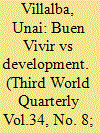

|
|
|
|
|
| Publication |
2013.
|
| Summary/Abstract |
The concept of development and the ways of achieving it have been widely criticised from various viewpoints. In the face of the apparent obsolescence of long-standing models, the novel Buen Vivir approach (roughly translated as 'living well' or 'good living'), which has arisen in different parts of Latin America, may offer an alternative paradigm. However, the implementation of policies that could lead to this Buen Vivir model requires profound changes that follow a range of complex transitions, which may often even seem contradictory in countries like Ecuador, where this approach has already been enacted in the new constitution and laws but where old development practices still continue. Accepting the plurality of visions on Buen Vivir (from the indigenous ontology to the 'Western-modern' approach), while at the same time positing common ground in which to define a new development strategy able to overcome a natural resource extraction-based economic pattern, is one of the immediate challenges.
|
|
|
|
|
|
|
|
|
|
|
|
|
|
|
|
| 7 |
ID:
124418
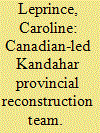

|
|
|
|
|
| Publication |
2013.
|
| Summary/Abstract |
The record of the Canadian-led Provincial Reconstruction Team (PRT) in Kandahar province, Afghanistan, provides a unique opportunity to evaluate the efficiency of Canada's recently adopted whole-of-government approach to conflict situations. This study maps the evolution of the interagency dynamics of Canadian departments and agencies during their six-year involvement with the PRT, and reveals that the Canadian-led PRT had to undergo significant changes before real interdepartmental collaboration actually could take place. While the first two years of the implementation of the whole-of-government approach have been described as a failure, this article argues that the publication of the Independent Panel on Canada's Future Role in Afghanistan was the turning point that significantly improved interagency collaboration in the PRT.
|
|
|
|
|
|
|
|
|
|
|
|
|
|
|
|
| 8 |
ID:
124451
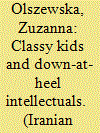

|
|
|
|
|
| Publication |
2013.
|
| Summary/Abstract |
This article reviews the ways in which class, status, social mobility and their cultural ramifications have been considered (or failed to be considered) in recent ethnographic studies of the Islamic Republic of Iran. It argues against the trend of privileging "resistance" to an oppressive state as a theoretical frame for documenting social phenomena in Iran: lifestyles and consumption patterns cannot be interpreted merely as signs of political rebellion because they are endowed with symbolic value as status attributes in a society whose class configurations are shifting. I present a number of sources and concepts that help to rethink these phenomena, and show how the experience of Afghan refugees living on the margins of Iranian cities illuminates both the opportunities and constraints created by the Islamic Republic's uneasy mix of political Islam, populism and neoliberalism. A focus on aspiration to upward mobility becomes a useful analytical lens that allows us to sidestep reductive dichotomies such as tradition/modernity or religion/secularism that are in practice blurred by its very pursuit.
|
|
|
|
|
|
|
|
|
|
|
|
|
|
|
|
| 9 |
ID:
135007
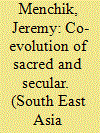

|
|
|
|
|
| Summary/Abstract |
While scholars of the Islamic revival have devoted attention to the increased prominence of Islamic law [the shari'a] in the once-secular public sphere, less attention has been paid to a countervailing trend. By mapping the evolution of Islamic law over the twentieth century, the author demonstrates that the shari'a is a product of decades of negotiations between Islamic institutions and more secular authorities including government ministers, doctors and social movements. This evolution suggests that secular authority and secular forms of knowledge have influenced but not displaced religious authority and religious forms of knowledge. The opposite is also true. This finding raises questions about the binary distinction between secular and sacred authority and suggests the co-evolution of religion and secularism in modern Muslim societies.
|
|
|
|
|
|
|
|
|
|
|
|
|
|
|
|
| 10 |
ID:
134207
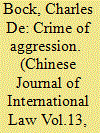

|
|
|
|
|
| Publication |
2014.
|
| Summary/Abstract |
With the end of the Cold War, military interventions in the name of an "expanded" interpretation of self-defense or in the name of humanitarian intervention have taken front stage. Hence the deep Third World support for the resurgence of the individual crime of aggression, through which they want to replace the concept of aggression front and centre before the international community. To counter any political use of the notion of aggression, Third World States want clear and unalterable definitions of both the crime of aggression and of State aggression, with this latter being an element of the former. In this article, after having shed light on the Third World's role in the long road to defining the individual crime of aggression and the State aggression underlying it, we will thus evaluate this effort. We will attempt to show that there is a strong possibility that any push towards criminalizing aggression at the level of the individual will not accomplish the desired goal. It could also severely backlash against the Third World States. We think there is a real risk that the accused standing before international criminal tribunals will be prejudiced by the power play that pervades international politics, however rigid the definition of the crime.
|
|
|
|
|
|
|
|
|
|
|
|
|
|
|
|
| 11 |
ID:
128094
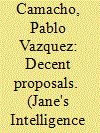

|
|
|
|
|
| Publication |
2012.
|
| Summary/Abstract |
Mexico's problems of violence and drug trafficking by organized crime groups have promoted demands fro change in security policy. Pablo Vazquez Camacho assesses the incoming president's plans for reform and tackling the causes of crime
|
|
|
|
|
|
|
|
|
|
|
|
|
|
|
|
| 12 |
ID:
129102
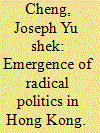

|
|
|
|
|
| Publication |
2014.
|
| Summary/Abstract |
This article reviews the literature on the radicalization of politics in Hong Kong. with an emphasis on its causes and impact. Evidence on the deteriorating living standards and the widening of the gap between the rich and the poor has been substantial. People naturally blame the government under such circumstances. They have been especially angry with government policies favoring the business community. and the "greed" and corruption of the Donald Tsang and C. Y. Leung administrations. The consensus on the origins. characteristics, modes of operation. and so on of the new social movements is strong: and the same applies to the failure of the government to anticipate and absorb their challenges. Confidence in the maintenance of social stability remains high. but there is little optimism that the performance of the govemment will soon improve.
|
|
|
|
|
|
|
|
|
|
|
|
|
|
|
|
| 13 |
ID:
124481
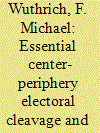

|
|
|
|
|
| Publication |
2013.
|
| Summary/Abstract |
For nearly forty years, scholars have utilized the metanarrative of a center-periphery cleavage first proposed by ?erif Mardin to explain a variety of phenomena in Turkish politics and society. When used to interpret electoral cleavages in the multiparty period, however, a center-periphery cleavage cannot effectively explain electoral outcomes. Focusing on the initial stage of multiparty competition, when the cleavage is often said to have been most salient, this article explores the empirical evidence to show that the concept as commonly employed has actually confounded an effective understanding of electoral behavior in Turkey. Rather than demonstrating a clear electoral division between the elites of the social center and the masses during this period, the article reveals two distinct cross-cutting patron-client strategies used by elite-dominated parties to cater to the rural population. The significant patterns of change in Turkey's electoral outcomes over time further illustrate the need to focus on how political parties and elites accumulate votes-that is, on their vote targeting strategies-rather than rely on static sociopolitical cleavages.
|
|
|
|
|
|
|
|
|
|
|
|
|
|
|
|
| 14 |
ID:
130172
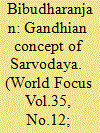

|
|
|
|
|
| Publication |
2014.
|
| Summary/Abstract |
As a practical social reformer, Gandhi noticed that inter-dining and inter-caste marriage are not going to abolish untouchability and inferiority among varnas exist. He strongly feels that the real cure lies in the change of heart. That is why, he was not enthusiastic about popularising these practices. To the questions whether inter-dining and inter-caste marriage are necessary for the removal of untouchability, his replay is both negative and affirmative. Negative because these are matters of individual concern and affirmative because, a person who refuses to take food touched by another on the plea inferiority, he is observing untouchability.
|
|
|
|
|
|
|
|
|
|
|
|
|
|
|
|
| 15 |
ID:
124656
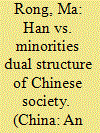

|
|
|
|
|
| Publication |
2013.
|
| Summary/Abstract |
While the "rural vs urban dual structure" has been a key issue for decades since China's social reform in the 1980s, the "Han vs minorities dual structure" receives scant attention in contemporary China. In the latter, Chinese citizens are differentiated by aspects of ethnic identity, administrative units, academic disciplines, education and even in arenas like entertainment and sports. A series of preferential policies targeted at ethnic minorities has been implemented by the government, e.g., family planning, school enrolment, financial assistance, personnel promotion and even the judicature. This dual structure, based on Stalin's theory and the Soviet system, emerged after China launched the "nationality/ethnic recognition" campaign in the 1950s. Many studies have proven that this system strengthened the "nationality" consciousness of each ethnic group but may otherwise be detrimental to national unity. This article offers a historical overview of China's transition from a traditional "central kingdom of the earth" into a modern nation-state, and detailed discussions about the Communist Party of China's new ideological framework on the "nationality/ethnic question", as well as the role that the "Han vs minorities dual structure" plays in contemporary China.
|
|
|
|
|
|
|
|
|
|
|
|
|
|
|
|
| 16 |
ID:
126506
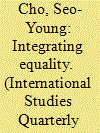

|
|
|
|
|
| Publication |
2013.
|
| Summary/Abstract |
This paper empirically investigates whether globalization can improve women's rights. Using panel data from 150 countries over the 1981-2008 period, I find that social globalization positively affects women's economic and social rights. When controlling for social globalization, however, economic globalization does not have any effect on women's rights. Despite the positive effect of (social) globalization on women's standing in a country, (marginalized) foreign women, proxied with inflows of human trafficking, are not beneficiaries of such "female-friendly" globalization effects.
|
|
|
|
|
|
|
|
|
|
|
|
|
|
|
|
| 17 |
ID:
124439
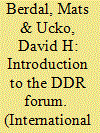

|
|
|
|
|
| Publication |
2013.
|
| Summary/Abstract |
Over the past two decades, international efforts to support the socio-economic adjustment of ex-combatants to the uncertain and often messy realities of postwar situations, have presented donor countries, NGOs and international organizations with complex, often formidable, institutional and logistical challenges. Many of these have been exhaustively and often expertly covered in the still burgeoning literature on disarmament, demobilization and reintegration (DDR). While they continue to merit scholarly and policy attention, the underlying focus of this special issue of International Peacekeeping is less on what we in the past have referred to as the mechanics of DDR - that is, how best to plan, organize, coordinate and fund DDR activities - than on the context and politics of reintegrating ex-combatants following protracted periods of armed conflict and civil war.
|
|
|
|
|
|
|
|
|
|
|
|
|
|
|
|
| 18 |
ID:
126855
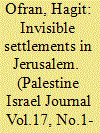

|
|
|
|
|
| Publication |
2011.
|
| Summary/Abstract |
When we talk about Israeli settlement activity in East Jerusalem, we usually mean an activity of one of two types: the large neighborhoods initiated after 1967 by the Israeli government and built on land unilaterally annexed to Jerusalem and expropriated for public needs - i.e., Ramot, Gilo, Pisgat Ze'ev, Har Homa and French Hill. These neighborhoods were set up so that Jewish settlements would encircle East Jerusalem, thus isolating it and separating it from the West Bank, so that East Jerusalem could not serve as the capital of a future Palestinian state. Starting in 1967, successive Israeli governments have undertaken the planning and construction of some 50,000 residential units in these neighborhoods and, today, more than 190,000 Israelis live in them.
|
|
|
|
|
|
|
|
|
|
|
|
|
|
|
|
| 19 |
ID:
126650
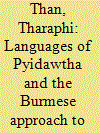

|
|
|
|
|
| Publication |
2013.
|
| Summary/Abstract |
Burma's first well known welfare plan was entitled Pyidawtha or Happy Land, and it was launched in 1952. In vernacular terms, the literal meaning of Pyidawtha is 'Prosperous Royal Country'. The government's attempt to sustain tradition and culture and to instil modern aspirations in its citizens was reflected in its choice of the word Pyidawtha. The Plan failed and its implications still overshadow the development framework of Burma. This paper discusses how the country's major decisions, including whether or not to join the Commonwealth, have been influenced by language; how the term and concept of 'development' were conceived; how the Burmese translation was coined to attract public support; and how the detailed planning was presented to the masses by the government. The paper also discusses the concerns and anxieties of the democratic government led by U Nu in introducing Burma's first major development plan to a war-torn and bitterly divided country, and why it eventually failed.
|
|
|
|
|
|
|
|
|
|
|
|
|
|
|
|
| 20 |
ID:
127824
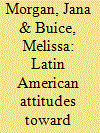

|
|
|
|
|
| Publication |
2013.
|
| Summary/Abstract |
This article outlines three theoretical arguments-socialization, status discontent, and elite cues-that generate competing predictions about the way context shapes gender attitudes. Using hierarchical analysis, we assess the power of these arguments in Latin America, a region that manifests considerable variation on our central explanatory variables and thus offers important theoretical leverage. We find men's gender attitudes to be highly contingent on elite cues and susceptible to backlash effects in response to women's economic advancement. Also, where women lack national representation, distrust of government promotes support for female leadership as an alternative to the discredited (male) establishment. The analysis supports existing individual-level explanations of gender attitudes and demonstrates a connection between diffuse democratic values and gender egalitarianism. The findings suggest that recent advances for female politicians in Latin America may be susceptible to reversal, and they illuminate strategies for strengthening women's equality in the region.
|
|
|
|
|
|
|
|
|
|
|
|
|
|
|
|
|
|
|
|
|